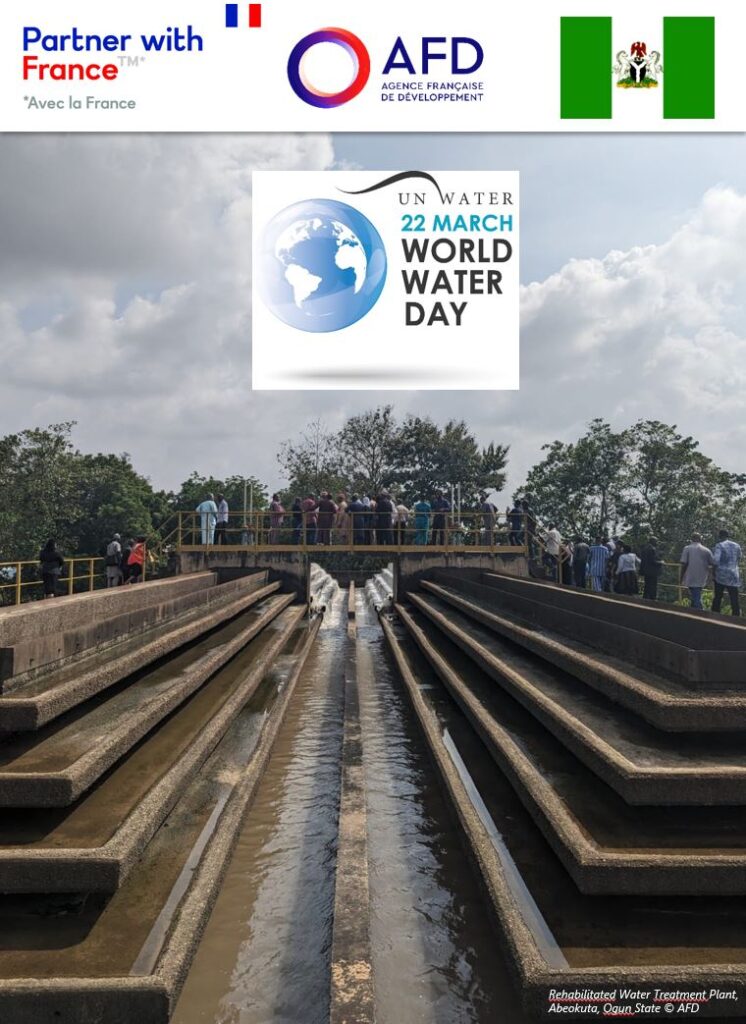
On the occasion of the World Water Day, the French government, through the Agence Française de Développement (AFD), shares how they are supporting water supply in Nigeria.
Water is one of the most basic and important need to human life and development. Cooking, drinking, farming and hygiene: all those vital needs depend on water. Yet, this resource remains unevenly spread. If the southern part of Nigeria benefits of heavy rain with more than 3 000 mm yearly in Calabar and over 1 700mm in Lagos, the central part sees two major rivers, Niger and Benue, flowing across its territory, while the northern part is characterized by a dryer climate, meaning less rain, fewer and smaller rivers. In Kano for instance, less than 700mm of rain fall every year.
If water is essential to life, it can also be related to conflicts, damages and diseases. The diversity of water uses such as irrigation, cattle breeding, drinking water, industrial and touristic activities, can also lead to conflicts. Also, flooding which is Nigeria’s top natural disaster often results in important damages and sometimes death. In addition, the absence of sanitation poses a major threat to public health and to the environment, which can have dramatic human consequences.
Water supply remains a major stake for Nigeria, whether in urban or rural areas. In 2019, more than 62 million Nigerians representing 30% of the population, had no access to basic water supply. In the years to come, investment needs in infrastructure will remain important in the country. In 2018, only 16 States out of 36 had operational urban water public utilities. Six States did not have water utilities at all. In a context of global warming and with a growing population, water supply however remains a strategic sector for Nigeria’s sustainable development.
For more than 15 years, AFD has been funding Water Boards and Corporations across 7 States. Impactful projects jointly financed with the World Bank were successfully completed in Cross-Rivers and Lagos benefiting to over one million people. In Calabar and other Cross rivers towns for instance, water availability increased from 6 hours a day to 23 hours.
In 2023, the first water project funded by AFD alone (33 million USD) came to an end. This support to the 3rd National Urban Water Sector reform program in Ogun State contributed to increase and improve the water supply of Abeokuta’s population.
A total of USD 233 million has been invested by AFD in the sector. To date, 4 Water Boards and Corporations still benefit from AFD’s financial and technical support, namely: Kano, Enugu, Ondo, and Plateau. Through these interventions, over 1,800,000 people should either get better access or a new access to water. With the long-term goal to increase the water supply to local residents, these interventions include two complementary components:
- Provide sustainable infrastructure through the construction or rehabilitation of water plants and the expansion of the existing water supply network (SDG6 Water and SDG3 Health);
- Improve water services through streamlined governance and institutional strengthening.
Improving water services can be achieved through the establishment of water tariff policies, the implementation of metering systems which can increase the financial autonomy and technical capacities of Water Boards and Corporations. To improve the long-term viability of urban water supply systems, it is also key to lower the maintenance costs, while optimizing operating costs and future investments.
The rapid demographic growth of Nigeria will require decades of investments in the sector to provide high quality water to the population. In addition, the climate change effects that Nigeria is already witnessing, will have a significant impact on the availability and distribution of water resources and its related human activities.
The risks of conflict between uses may increase, affecting rural areas and agriculture, as it is already the case in several Nigerian States. Beyond the intensification of conflicts between breeders and farmers, the food production capacities could be impacted. In addition, the risk of flooding will most certainly increase, whether in urban or rural areas. Without a proper water resources management, the economic and human consequences could hamper Nigeria’s economic growth.
The public water supply corporations will be more than ever at the forefront of this battle against climate change and will have to thrive to adapt. In parallel, Nigeria will have to keep increasing public investments in sustainable infrastructure and engage institutional reforms to improve the governance of the water sector.
There is no doubt that the “Blue Gold” will remain a sensitive resource, either as a threat or as a source of prosperity. France through AFD will stay alongside Nigeria to support this transition. To find more about AFD’s actions in the sector, read the latest activity report: Water and Sanitation – 2022 Activity Report | AFD – Agence Française de Développement.
*Article as received from the Ambassade de France au Nigéria
